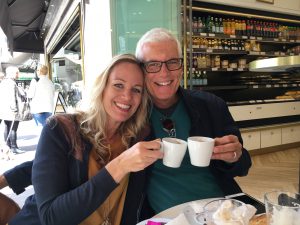Yesterday I just sat and listened to her talk about me even though my impulse was to interrupt.
I Panicked.
If you're keeping track, not that I expect you to, but if you were, then you'd notice that it's been two weeks since I've posted a blog. That's partly due to the fact that I am working on my book proposal for my next book so my writing time has been directed toward that consuming endeavor.
And for those of you who haven't written one before, it's basically a 60 page document about my book idea that my agent will use to sell the book. In it I have to outline all my chapters, put together my promotional plan, write two sample chapters, and try to convince whoever is reading it that I'm worth their risk. Once it sells, then I'll write it. And if all goes well, the book will be available in like 2 years! Crazy process, huh?
But it's been really rewarding to outline my idea and give it life. To see my message being given words is exciting!
Until two nights ago. Then it wasn't so much fun anymore. Just when I thought I was 80% done, I wondered if I needed to start over. :(
The creative process, being what it is, made me start questioning the whole enchilada! Who's going to read this, anyway? I mean, really.. who specifically is going to be drawn to this book? What ache is going to cause them to walk into a bookstore and buy this book? What are they feeling--when they open my book to the first page--that I need to be able to articulate? Basically, though I'm embarrassed to admit it, I felt like I knew the answer, but didn't know what the question was. (Are you willing to help me brainstorm? Here is a 10-question survey where I'd love to hear your opinion!)
Anyone who spent any time with me in the last 2 days was subjected to me quizzing them, begging them to give me the answers that were alluding me. What would make you buy this book, I inquired? Do you like this title or this title? Is this idea worth fleshing out? (Funny how scared we can get even when we know to our core that this is the message I am meant to be giving!)
They Witnessed.
Fortunately, as fate would have it, yesterday was a full scheduled day of engaging with wonderful people. The morning began with conversations with women from my masterminding groups who helped think through felt needs and title ideas, and the day ended with a 5-hour dinner with an amazing couple whom my husband and I adore, who both communicated such an excitement to read this book that it made me want to come home and write the whole thing at once!

And tucked in the middle of my day was meeting a friend I hadn't seen in a few months for tea. As I was expressing my concerns to her, she started saying, "I loved how you talked about it when you gave that one talk wearing that sequined dress..."
My eyes narrowed. "In Seattle? But you weren't there!"
To which she replied, "Oh I watch all your videos." WHAT?! Seriously? Wow. I felt seen.
And then she began to go into detail describing what she liked about it, how she felt like I put my audience at ease, and how the message is indeed in me... This is where I was tempted to interrupt.
My impulse was to say thanks, or change the subject, or brush it off. I mean, isn't it kind of weird to just sit there and take it all that goodness for too long? I don't want to look like a dry desert starving for any drop of water! I value humility.
But a voice of wisdom whispered in me: "You need to hear this. It's important to hear how people experience you and see you. What you feel from the stage and what they feel from the audience is vastly different. You have a woman in front of you willing to hold up a mirror-- look at it Shasta."
So I looked. I listened intently. Not from a place of arrogance (isn't that what we're all so afraid of that makes us err on the side of false humility?), but from a place of inquiry and appreciation.
I soaked in how she experienced me and I thought, "I want to bottle this up and write this opening chapter for her... to match what she sees."
The Power of Witnessing
I think our default, especially as women, is to give advice to each other. Whatever problem someone has we think, "What would I do?" and then we offer up any ideas that come to us. If we lack solutions, then we go to, "When have I felt this way?" and we offer up a story about how we know what they're feeling.
Advice and Relating are kind of our default modes. But notice how both approaches turn the focus on us and how we feel, instead of keeping it on them and how they feel?
What my girlfriend Jaime did for me yesterday was hold the attention on me. She witnessed me. She showed me that she saw me and reminded me that she liked who she saw.
She asked me questions to help me think about it differently: "Pretend you're giving your first interview on this book and they ask you why you wrote this one-- what will you say?"
She reflected back to me where I am strong and beautiful. She spoke of my essence--that which she experiences about me, those things that I am without having to do or be them, because I just am those things. She saw me and she wasn't scared to tell me.
And, while I credit her with offering up the gift of validating a friend; I realize that just as important was me be willing to receive it. If you're anything like me, it can be far more comfortable to give it, than to take it.
But what she said grounded me in who I am and what I have to offer. And my next book will be the better for me not having interrupted the gift of her witnessing.
May everyone be the kind of friend who witnesses their friends verbally and reminds them of their essence.
Would love to hear if you feel like you get enough of this in your relationships? Do you find it easy to give to others? Do you wish others gave it to you more often?



 for
for 
